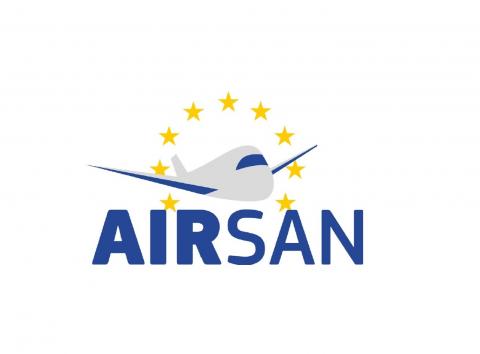Public health in the aviation sector: the AIRSAN project

Two guidance documents supporting the response to public health threats in air transport were developed by the AIRSAN Project: the first on Remote risk assessment and management of communicable disease events on board an aircraft and the second on Contact tracing – Collaboration between the public health and the aviation sector. The rapid increase of air transport has resulted in a growing risk of cross-border public health threats in the EU. Even though, a number of EU legal documents exist on the coordination of PHT, no formal arrangements exist to coordinate response to PHT in the aviation sector. These two guidelines, with other tools developed by AIRSAN Project, represent a necessary response to this gap.
The AIRSAN Project, funded by the Health Programme of the European Union in April 2013 and coordinated by Robert Koch Institute, the national public health institute of Germany was created with the aim to support EU Member States in ensuring a well-organized and coherent response to public health threats in air transport and to facilitate the implementation of the International Health Regulations (IHR, 2005) and it is now drawing to its close, but all projects outputs will continue to be used, particularly the bibliography and the training tool. The bibliography comprises a list of guidance material that cover public health threats in air transport on international level. These documents were reviewed and systematically presented in form of an annotated searchable bibliography. The training tool offers authorities and companies a framework to test the existing preparedness and response plans as well as coordination between the public health and the aviation sector in case of cross-border public health emergencies. The developed framework is designed as a tabletop exercise based on different scenarios around a potential transmission of infectious diseases via air travel. The AIRSAN training tool was tested in five pilot exercises at different airports and offers a standard tool for trainings of relevant stakeholders.
AIRSAN team (newsletter February 2016) has stressed the importance of implementing a coordinated reaction among multiple stakeholders, from national public health authorities like WHO or ECDC to national civil aviation authorities, from airport and airline management to medical services across EU Member States, as well as from Turkey and Israel. AIRSAN team would also like to reinforce the use of the AIRSAN communication platform (another useful output where there is currently a discussion ongoing regarding infection control measures at European airports) or the updated AIRSAN bibliography. These are tools that could also support the response to Zika virus infections similarly as it was possible during the time of the climax of the outbreak of Ebola Virus Disease. In order to continue spreading information about the project, the AIRSAN website will carry on functioning and hosting project products, most of them are available at the open-access area. All project partners are invited to organize tabletop exercises and to propose questions, consultations, suggestions and initiatives.
The AIRSAN Project is an important action for management and control of public health threats in the aviation sector and it could be implemented by working with a third AIRSAN guidance document regarding ethical aspects in preparedness and response in air transport. In fact, ethical questions are little addressed in most pandemic plans developed from European countries, with reference for instance to public health interventions to protect the community and that limit personal freedom of movement. It could be useful to integrate the keywords used in the AIRSAN searchable bibliography (such as isolation and quarantine) with some, specific words related to ethical questions (such as ethics, ethical, human rights, civil rights etc.). Moreover, some documents listed in the AIRSAN bibliography mention or stress the importance of ethical principles in pandemic plans. Thus, dealing with ethical issues also in the preparedness and response to public health threats in air transport could be a possible, further step for the AIRSAN partners in the future.
